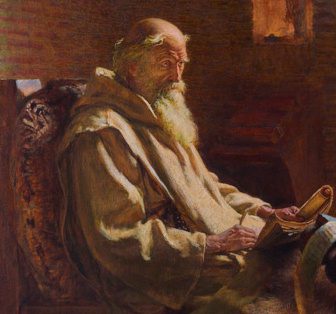
According to the Venerable Bede’s extraordinarily important Historia ecclesiastica gentis Anglorum (An Ecclesiastical History of the English People), which was written by that Anglo-Saxon monk and scholar in the early 700s AD, a man named Drythelm died one evening of a serious disease. However, his grieving relatives were “terrified beyond measure” the next morning when he suddenly awakened and arose from his deathbed. Drythelm first told his story to his wife and then to a monk, who related it, in his turn, to Bede:
I was guided by a man of shining countenance and wearing bright robes. We went in silence in what appeared to me to be the direction of the rising of the sun at the summer solstice. As we walked we came to a very deep and broad valley of infinite length. It lay on our left and one side of it was exceedingly terrible with a raging fire, while the other was no less intolerable on account of the violent hail and icy snow which was drifting and blowing everywhere. . . . Since a countless multitude of misshapen spirits, far and wide, was being tortured in this alternation of misery as far as I could see, and without any interval of respite, I began to think that this might be hell, of whose intolerable torments I had often heard tell. But my guide who went before me answered my thoughts, “Do not believe it,” he said, “this is not hell as you think.”
As we entered this darkness, it quickly grew so thick that I could see nothing except the shape and the garment of my guide. . . . I saw, as the globes of fire now shot up and now fell back again ceaselessly into the bottom of the pit, that the tips of the flames as they ascended were full of human souls which, like sparks flying upward with the smoke, were now tossed on high and now, as the vaporous flames fell back, were sucked down into the depths. . . .
It was the one who had guided me before. . . . He began to lead me in the direction of the rising of the winter sun and quickly brought me out of the darkness into a serene and bright atmosphere. As he led me on in open light, I saw a very great wall in front of us. . . . When we had reached the wall we suddenly found ourselves on top of it. . . . There was a very broad and pleasant plain, full of such fragrance of growing flowers that the marvelous sweetness of the scent quickly dispelled the foul stench of the gloomy furnace which had hung around me. . . . In this meadow there were innumerable bands of men in white robes, and many companies of happy people sat around. . . . I began to think that this might perhaps be the kingdom of heaven of which I had often heard tell. But he answered my thought: “No.” . . .
When we had passed through these abodes of the blessed spirits, I saw in front of us a much more gracious light than before, and amidst it I heard the sweetest sound of people singing. So wonderful was the fragrance which spread from this place that the scent which I had thought superlative before, when I savoured it, now seemed to me a very ordinary fragrance; and the wondrous light which shone over the flowery field, in comparison with the light which now appeared, seemed feeble and week.
Drythelm was then told to return to his body and, upon his return, he gave away his possessions and retired to a Benedictine monastery.
The seeming torments related in this account are problematic from a Latter-day Saint perspective, and I may have more to say about such things later (“‘Do not believe it,’ he said, ‘this is not hell as you think'”). But I notice that Drythelm seems, interestingly, to describe what might be termed three distinct “kingdoms” in the afterworld.
I’ve read Bede myself and I recall this specific account, but I was reminded of the story by Pim van Lommel, Consciousness Beyond Life: The Science of the Near-Death Experience (New York: HarperCollins, 2010), 99-100, from which the quotation above is taken.










